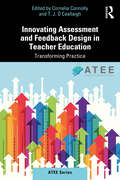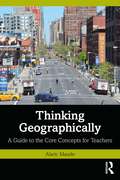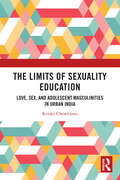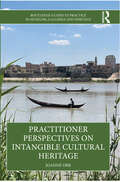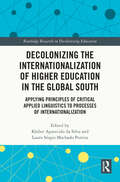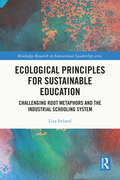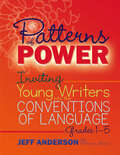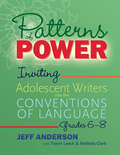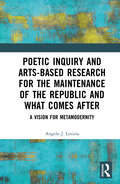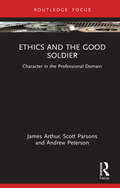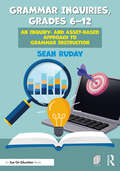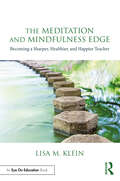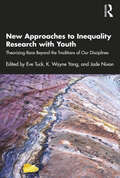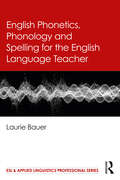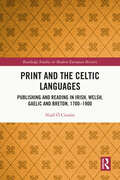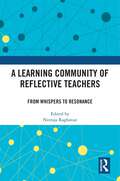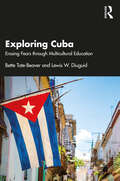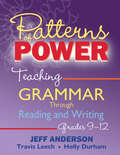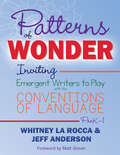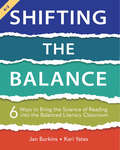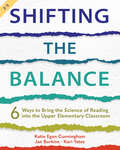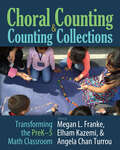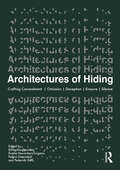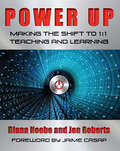- Table View
- List View
Innovating Assessment and Feedback Design in Teacher Education: Transforming Practice (ATEE Series)
by Cornelia Connolly T. J. Ó CeallaighAssessment and feedback are central to the question of how teacher educators can enhance and transform teaching and learning. This edited volume details case studies and empirical research presenting alternative innovative designs for assessment and feedback across a range of programmes, mediums and jurisdictions. While the swift and unexpected digital pivot during the pandemic emphasised how teacher education adopted and facilitated online teaching, supervision and practice, there is now a need for increased attention to support alternative approaches. Innovating Assessment and Feedback Design in Teacher Education considers the perspectives and experiences of teachers, educators and students, while also exploring discipline-specific practices and outcomes, professional competencies as well as issues pertaining to quality, equity, inclusion, accountability, academic integrity and success. Carefully chosen international contributors provide cutting-edge research findings and discuss its practical implications covering the development, deployment and evaluation of classroom-based, hybrid and remote approaches. This book elaborates upon the transformative assessment and feedback approaches taken by teacher educators to inform the future landscape of teaching and learning in a digital age. Illustrating key developments in the field, examples of best practice, dialogues integrating the student perspective, worked examples and international perspectives, this key book is an invaluable resource for teacher educators striving to improve their practice.
Thinking Geographically: A Guide to the Core Concepts for Teachers
by Alaric MaudeThis book explains how the concepts of geography can teach young people to think geographically, deeply and ethically. Thinking Geographically demonstrates how the concepts of place, space, environment and interconnection teach students new ways of perceiving and understanding the world, the concepts of scale and time teach them ways of analysing the world, while the concepts of sustainability and wellbeing show them how to evaluate and reflect on what they observe, and all eight concepts develop their higher order and critical thinking. To further support teachers, this book includes a chapter on how to teach for conceptual understanding, as well as two chapters that illustrate the application of geographical thinking to an understanding of the effects of land cover change and the problem of regional inequality. Rich with practical examples, this book is an essential resource for geography teachers, whether already teaching or studying to become one, and for those who teach therm.
The Limits of Sexuality Education: Love, Sex, and Adolescent Masculinities in Urban India
by Ketaki ChowkhaniThis book explores different strands of thinking about sexuality education in contemporary urban India. It interrogates the limits of sexuality education as we know it today by rethinking adolescent masculinities in middle-class urban India. This book contributes to the wide gap in theorising sexuality education and adolescent masculinities in urban India. It presents an adolescent perspective on sexuality education, looks at adolescent love from the school teachers’ perspective, and tries to understand a teacher’s negotiations with student romance. It unravels the sexual and romantic lives of adolescents and examines the circulation of sexual knowledge and sources of information on sex that adolescent boys in India have access to. This book uncovers the limits of sexuality education by examining State, feminist, Christian, and sexological materials on sexuality education in Mumbai and Delhi. Based on detailed research and narratives from teachers, young men, and women, the book explores adolescent male romance and its affective registers, adolescent male sexual knowledge, and the regulation of romance in school spaces. This book will be of interest to students and researchers of education, sexuality and gender studies, masculinity studies, sex education as well as those interested in education policy, education politics, educational research, and inclusion and special education. Located at the intersection of sexuality studies, education, masculinity studies, and cultural studies, it will also appeal to those working in sexuality education in urban India within the complex web of the middle classes, consumerism, post-feminism, romance, adolescent masculinities, and cinema.
Practitioner Perspectives on Intangible Cultural Heritage (Routledge Guides to Practice in Museums, Galleries and Heritage)
by Joanne OrrPractitioner Perspectives on Intangible Cultural Heritage provides an accessible introduction to the Intangible Cultural Heritage field. Summarising the major changes that have taken place over the last two decades, the book explores ongoing debates and changes in thinking about best practice. Drawing on the author’s own experience of operationalising the UNESCO 2003 Convention for the Safeguarding of Intangible Cultural Heritage in a variety of contexts, Orr also incorporates international case studies from practitioners and provides valuable insights about best practices. Demonstrating that the top-down, state-driven hierarchy for the safeguarding of heritage is starting to shift to a model of shared ownership and values driven by communities and practitioners, the book shows that the notion of the ‘expert’ is also diversifying to include other forms of transmission of traditional knowledge. Orr argues that these different perspectives provide a platform to enrich understanding and knowledge and create a stronger basis for the safeguarding of heritage - both intangible and tangible. Exploring some of the policy developments that have laid the foundations for the future involvement of community and practitioners in the global discourse, the book also suggests how practitioners can expand networks and contribute to the global discourse. Practitioner Perspectives on Intangible Cultural Heritage will appeal to museum curators and other heritage professionals, as well as students and academics engaged in the study of museums and heritage, art, and cultural policy and management.
Decolonizing the Internationalization of Higher Education in the Global South: Applying Principles of Critical Applied Linguistics to Processes of Internationalization (Routledge Research in Decolonizing Education)
by Kleber Aparecido da Silva Lauro Sérgio Machado PereiraThis book reconceives the internationalization of higher education from the perspective of Global South researchers, empowering and giving visibility to this discourse. Challenging the first assumptions of internationalization of higher education (IHE) as something overwhelmingly positive due to the way it directly impacts the university activities and their world rankings, it instead takes a critical perspective, acknowledging that this process is associated with a neoliberal and colonial orientation that focuses on the maintenance of historically sustained hierarchy, oppressive relations that stimulate the production of knowledge, and education as a commodity and not as a factor of social transformation. As such, it challenges recent trends toward an increase in internationalization strategies within higher education that privilege Global North outgoing mobilities and research collaborations to sustain the position of the educational institutions in the international rankings. From this locus, IHE is seen not only to evolve in the fields of teaching, research, and service of an educational institution but also to boost the world’s social development. The book thus illustrates how IHE should be guided by Critical Applied Linguistics (CAL) and Global South’s principles: applied linguistics, praxis, critical thinking, micro and macro relations, critical social inquiry, critical theory, problematizing givens, self-reflexivity, preferred futures, and heterosis. Comprising chapters that discuss academic, political, and administrative issues arising specifically from the internationalization process of Global South higher education institutions, as well as themes such as critical language education and language policies, it will appeal to faculty, researchers, and scholars with interests in higher education, international and comparative education, and the decolonization of education.
Ecological Principles for Sustainable Education: Challenging Root Metaphors and the Industrial Schooling System (Routledge Research in Educational Leadership)
by Liza IrelandThis book explores how the education sector can transition to being truly sustainable and why necessary innovations for educational change are being subverted and undermined when mapped onto the existing industrial educational system.Based on PhD case study research with schools that are modelling and teaching sustainability, action research, and the author’s 40 years of working in the K-12 system, this volume examines how education continues to perpetuate the status quo, and why education innovations are thus undermined. It shows the importance of redesigning education based on the principles of sustainable living systems and explores how this can be achieved across all levels of the educational system. The first part of the book establishes a new vision of sustainable education, whilst the second brings to light the industrial mechanistic root metaphors in current practice across leadership and administration, buildings and grounds, curriculum design, teaching, and learning that are subverting innovative efforts. From understanding the foundational, influential, problematic root metaphors of our "Industrial" educational system, it moves to explore how the ecological principles of sustainability can be used to rethink and redesign an educational system, from its administration, leadership, and policy, to curriculum, buildings, grounds and resources, through to teaching and learning, that will support sustainability, innovation, and creativity, developing systems thinking and sustainability as a frame of mind.Exploring how the education sector can transition to being truly sustainable and find new ways to traverse the problematic "Industrial" world view at this pivotal moment, will appeal to administrators, post-secondary educators, policymakers, and researchers and scholars of sustainability education, educational leadership, curriculum design, and educational philosophy.
Patterns of Power, Grades 1-5: Inviting Young Writers into the Conventions of Language (Patterns of Power)
by Jeff Anderson Whitney La RoccaAuthor Jeff Anderson and literacy coach Whitney La Rocca lead a vibrant approach to grammar instruction in Patterns of Power, Grades 1-5: Inviting Young Writers into the Conventions of Language. Here, young, emergent writers are invited to notice the conventions of the English language and build off them in this inquiry-based approach to instructional grammar. The book comes with standards-aligned lessons that can be incorporated in 10 minutes a day. Patterns of Power’s responsive, invitational approach puts students in an involved role and has them explore and discuss the purpose and meaning of what they read. Students study short, authentic texts and are asked to share their findings out loud, engaging in rich conversations to make meaning. Inside you’ll find: Ready-to-use lesson plan sets that include excerpts from authentic and diverse mentor texts curated for grades 1-5 and can be adapted over 5 grade levels Real-life classroom examples, tips, and Power Notes gleaned from the authors’ experiences that can be applied to any level of writer Resources, including a Patterns of Power Planning Guide and musical soundtracks, to use in classroom instruction or as handouts for student literacy notebooks Patterns of Power, Grades 1-5 provides a simple classroom routine that is structured in length and approach, but provides teachers flexibility in choosing the texts, allowing for numerous, diverse voices in the classroom. The practice helps students build cognitive recognition and provides a formative assessment for teachers on student progress. With these short lessons, students will grow their confidence and move beyond limitation to produce effortless writing in your class and beyond. The Patterns of Power series also includes Patterns of Power, Grades 6-8: Inviting Adolescent Writers into the Conventions of Language; Patterns of Power en Español, Grades 1-5: Inviting Bilingual Writers into the Conventions of Spanish; Patterns of Power, Grades 9-12: Teaching Grammar Through Reading and Writing and Patterns of Wonder, Grades PreK-1: Inviting Emergent Writers to Play with the Conventions of Language.
Patterns of Power, Grades 6–8: Inviting Adolescent Writers into the Conventions of Language (Patterns of Power)
by Jeff Anderson Travis Leech Melinda ClarkAuthors Jeff Anderson, Travis Leech, and Melinda Clark lead a vibrant approach to grammar instruction in Patterns of Power, Grades 6-8: Inviting Adolescent Writers into the Conventions of Language. Here, young, emergent writers are invited to notice the conventions of the English language and build off them in this inquiry-based approach to instructional grammar. The book comes with standards-aligned lessons that can be incorporated in just 10 minutes a day. Patterns of Power’s responsive, invitational approach puts students in an involved role and has them explore and discuss the purpose and meaning of what they read. Students study short, authentic texts and are asked to share their findings out loud, engaging in rich conversations to make meaning. Inside you’ll find: Ready-to-use lesson plan sets that include excerpts from authentic and diverse mentor texts curated for grades 6-8 Real-life classroom examples, tips, and Power Notes gleaned from the authors’ experiences that can be applied to any level of writer Resources, including a Patterns of Power Planning Guide and musical soundtracks, to use in classroom instruction or as handouts for student literacy notebooks Patterns of Power, Grades 6-8 provides a simple classroom routine that is structured in length and approach, but provides teachers flexibility in choosing the texts, allowing for numerous, diverse voices in the classroom. The practice helps students build cognitive recognition and provides a formative assessment for teachers on student progress. With these short lessons, students will gain confidence and move beyond limitation to produce effortless writing in your class and beyond. The Patterns of Power series also includes Patterns of Power, Grades 1-5: Inviting Young Writers into the Conventions of Language; Patterns of Power en Español, Grades 1-5: Inviting Bilingual Writers into the Conventions of Spanish; Patterns of Power, Grades 9-12: Teaching Grammar Through Reading and Writing; and Patterns of Wonder, Grades PreK-1: Inviting Emergent Writers to Play with the Conventions of Language.
Poetic Inquiry and Arts-Based Research for the Maintenance of the Republic and What Comes After: A Vision for Metamodernity
by Angelo J. LetiziaThis book demonstrates the power of poetry and the ways in which academics can utilize poetry to go beyond the scholarly realm and create works of art which, unlike traditional academic works, problematize and question reality rather than simply describe it. Through its disciplinary, scholarly, and personal construction, poetry holds the potential to “erase” what we know and build a new world. The purpose of this book is to show how professors and students who write poetry can be emboldened to imagine new forms of government and political arrangements, promote social change and challenges to power structures, and detail radical ways of living with each other more generally. Conceiving of the “republic” as a democratic republic, or representative democracy, the author calls attention to the idea of poetry as evidence-based, which, despite the absence of verifiable data, nonetheless gives structure to ideas and experiences filtered through human cognition, imagination, and senses. Grounded in theory, arts-based research, and poetic inquiry and supplemented with practical class assignments, pedagogical strategies, and reflective items, this volume will appeal to faculty, scholars, and postgraduate students working across research methods, arts-based research and practice, and language and linguistics.
Ethics and the Good Soldier: Character in the Professional Domain (Character and Virtue Within the Professions)
by James Arthur Scott Parsons Andrew PetersonBuilding on extensive, internationally leading empirical research conducted by the Jubilee Centre for Character and Virtues, this book explores the soldier as a virtuous professional through a close examination of soldiers’ character and ethical reasoning. Starting from the view that virtues such as courage, honesty, loyalty and integrity are core to being a professional soldier, the book draws on insights from British soldiers at three stages of their career – officer cadets (at Sandhurst), junior lieutenants/captains (attending the Junior Officer Tactical Awareness Course), and senior captains (participating in the Captain’s Warfare Course). Drawing upon the Jubilee Centre’s Soldiers of Character study, the book explores soldiers’ character in the professional domain. Including clear implications for practice and research, this is essential reading for all those interested in the character of soldiers in both a professional and academic setting.
Grammar Inquiries, Grades 6–12: An Inquiry- and Asset-Based Approach to Grammar Instruction
by Sean RudayIn this book, grammar expert Sean Ruday shows you how to apply the principles of inquiry-based learning to improve your grammar instruction. Grammar often gets relegated to worksheets or rote tasks, but with this volume you’ll find a wealth of strategies and tools for making grammar instruction engaging and meaningful. Designed for middle- and high-school ELA teachers, this book covers all aspects of grammar instruction through an asset-based approach and includes many methods, ideas, and takeaways for instruction. Featuring real-world examples of student work and a sample lesson plan, this is an essential resource for teachers who wish to enliven instruction and teach grammar effectively.
The Meditation and Mindfulness Edge: Becoming a Sharper, Healthier, and Happier Teacher
by Lisa M. KleinTeachers juggle a lot, so the ability to stay focused, calm, and mentally sharp is critical. This generous and heartfelt book shows you how meditation and mindfulness practices can enable you to not only survive but flourish in the classroom. Dr. Lisa Klein presents powerful findings on the effects of meditation on teachers. She reveals the positive effects that meditation had on her and her own career in education. She also shares personal stories that demonstrate how meditation may offer a balm to help teachers stay healthy mentally and physically while tapping into higher levels of awareness, including experiences of self-actualization and synchronicity. In addition, she offers practical, simple strategies for both developing teacher presence and shifting to a more positive classroom energy. This powerful book moves beyond basic self-care tools to help you develop a new, lifelong practice. Anyone involved in education can benefit from this book, as can anyone interested in learning more about how meditation can help with health and well-being in general.
New Approaches to Inequality Research with Youth: Theorizing Race Beyond the Traditions of Our Disciplines
by Eve Tuck K. Wayne Yang Jade NixonThose engaging in research to reduce youth inequality know that robust and resonant theories are needed alongside strong methods to study racialization, racism, and the consequences of racial categorization. This edited volume shares contributors’ first-person narrations of some of the hard-fought learnings and challenges of breaking from the traditions of their disciplinary fields and finding new and reclaimed ways to think about race. Featuring contributors’ narrations of how they came to engage with compelling theories of Blackness, Indigeneity, and/or racialization, and how such theories inform the social science research they do with young people, this timely and consequential text tells a multi-disciplinary story about the careful reading and co-theorizing that is required to refuse universal theories of Blackness, Indigeneity, and racialization.
English Phonetics, Phonology and Spelling for the English Language Teacher (ESL & Applied Linguistics Professional Series)
by Laurie BauerThis resource supports TESOL preservice and in-service teachers and curriculum designers in teaching pronunciation more effectively. Laurie Bauer examines the patterns of pronunciation found in English, comments on common errors made by learners, provides advice on what must be taught and what can be allowed to pass, and offers commentary on which parts of the curriculum are necessary for beginners and which are of value only to advanced students. Part I introduces the phonetic background; Part II covers phonetics in more detail (consonants, vowels, prosody, phonotactics and syllables); Part III covers phonology (sound changes influenced by adjacent sounds, morphophonemics, stress rules and free variation); and Part IV covers spelling (English spelling, spelling consonants and vowels, and spelling particularly difficult words). The helpful content can be tailored to one’s teaching needs and will support an educator’s efforts to teach pronunciation seriously, whether it is a matter of pronouncing particular vowels accurately or knowing how to interpret the spelling system to get at the appropriate pronunciation.
Print and the Celtic Languages: Publishing and Reading in Irish, Welsh, Gaelic and Breton, 1700–1900 (Routledge Studies in Modern European History #102)
by Niall Ó CiosáinThis book is a study of the print cultures of the four principal Celtic languages — Irish, Welsh, Gaelic and Breton — in the crucial period between 1700 and 1900. Over the past four centuries, the Celtic languages of northwest Europe have followed contrasting paths of maintenance and decline. This was despite their common lack of official recognition and use, and their common distance from the centres of political power. This volume analyses publishing, circulation and reading in the four languages, particularly at a popular level, showing the different levels of overall activity as well as the distinctions in the types of printed texts between regions. The approach is a broad one, considering all printed books down to very small cheap formats. It explores the interactions between the different regions and the continuation of print culture within diasporic communities. This volume will appeal to book historians, to scholars of the four languages and their literature, and to students of Celtic studies.
A Learning Community of Reflective Teachers: From Whispers to Resonance
by Neeraja RaghavanTeachers possess a wealth of untapped wisdom and valuable experience. Whether it’s in matter of educational policy, curriculum development or textbook selection, teachers carry a trove of information and insights to share. Traditionally, teacher development has been driven by administrators of schools, and it often takes the form of a ‘mentor’ teaching the staff of a school. But what happens when teachers across different locations collaborate and learn together? This volume documents such an initiative, sparked off by the Covid-19 pandemic, which brought people together online. It underscores the power of teachers debating, discussing, and learning from each other. Based on an Indian experience, the book addresses a range of issues teachers and educators face across the world — encompassing pedagogy, classroom management, school culture and teacher development. A unique story of community building and teacher education, this book also contains key outcomes and insights which take us through their action research projects and showcases a model of teacher development that can be adopted by interested readers. Above all, it brings out the crying need for a teacher’s voice to be heard — for far too long, teachers have been mere implementers of decisions taken by policy makers or managements of schools. By means of networking communities such as the one described in this book, the transformation of teachers going from whispers to resonance is greatly amplified. An important intervention in the domain of teacher development, this volume will be of great interest to students, researchers and practitioners of education, teacher education, and sociology of education. It will also be useful for teacher trainees, academicians, teacher educators, policymakers, schoolteachers, curriculum developers, teacher training institutes, and universities offering teacher education programs.
Exploring Cuba: Erasing Fears through Multicultural Education
by Bette Tate-Beaver Lewis W. DiuguidExploring Cuba: Erasing Fears Through Multicultural Education details the cultural and professional exchanges to Cuba organized by the National Association of Multicultural Education (NAME) between 2015 and 2019, with additional reflections on the impact of the coronavirus pandemic on Cuba—U.S. relations. Because of the long-imposed U.S. embargo, or blockade, access to information about life in Cuba can be limited in the U.S. This book chronicles first-hand account of NAME’s trips to Cuba over a 5-year period. Interspersed with insights from U.S.-based multicultural educators, authors and Cuban delegates, it documents what NAME members learned about Cuba’s people, history, health care system, culture, arts, and education systems. It also explores the effects of the coronavirus global pandemic on Cuba and its vital tourist industry, as well as the July 2021 protests and aftermath, including a new wave of immigration to the U.S. The book argues for the end of the U.S. embargo with Cuba and the normalization of diplomatic relations between the two countries, so that unrestricted tourism and trade can benefit both countries. Combining travelogue observations with statistics and scholarly accounts, this volume will be useful reading for scholars and students of Multicultural Education, International Education and Comparative Education. It will also be beneficial to educators and Cuba solidarity activists.
Patterns of Power, Grades 9-12: Teaching Grammar Through Reading and Writing
by Jeff Anderson Travis Leech Holly DurhamTraditional grammar instruction often focuses too much on what’s right or what’s wrong, hiding the true power of conventions—the creation of meaning, purpose, and effect. Instead of hammering high school students with the mistakes they should avoid, Jeff Anderson, Travis Leech, and Holly Durham suggest exploring grammar through the celebration of author’s purpose and craft. In Patterns of Power, Grades 9-12: Teaching Grammar Through Reading and Writing, they invite you to create an environment in which writers thrive while studying and appreciating the beauty, effects, and meaning of grammar. Inside this book, teachers will find a comprehensive explanation of the brain-based Patterns of Power invitational process, as well as: 35 standards-aligned lesson sets built around practical, engaging, inquiry-based methods that take deeper dives into grammar and craft than any worksheet, quiz, or editing exercise ever could A variety of high-interest model texts from authentic and diverse sources, including excerpts from classic and current novels, memoirs, plays, graphic novels, poems, and media Real-life classroom examples and tips with suggestions for scaffolding new learning and ideas for how to use the lessons in AP courses Templates for extended application, easy to locate printables, and ready-to-go visuals Additional Models for Further Study for extension opportunities in every lesson set An entire chapter devoted to helping high school writers master citations in research With hundreds of teach-tomorrow resources and implementation supports such as quick-reference guides, specific applications to reading instruction, and soundtrack suggestions to infuse the joy of music into grammar instruction, Patterns of Power, Grades 9-12 gives you everything you need to inspire your high school writers to move beyond limitation and into the endless possibilities of what they can do as writers. The Patterns of Power series also includes Patterns of Power, Grades 6-8: Inviting Adolescent Writers into the Conventions of Language; Patterns of Power, Grades 1-5: Inviting Young Writers into the Conventions of Language; Patterns of Wonder, Grades PreK-1: Inviting Emergent Writers to Play with the Conventions of Language; and Patterns of Power en Español, Grades 1-5: Inviting Bilingual Writers into the Conventions of Spanish.
Patterns of Wonder, Grades PreK-1: Inviting Emergent Writers to Play with the Conventions of Language
by Whitney La Rocca Jeff AndersonWhitney La Rocca and Jeff Anderson adapt their vibrant approach to grammar instruction in Patterns of Wonder, Grades Prek-1: Inviting Emergent Writers to Play with the Conventions of Language. Here, young, emergent writers are invited to notice the conventions of language and build off them in this inquiry-based approach to instructional grammar. The book comes with standards-aligned lessons that can be incorporated in just 10 minutes a day. Patterns of Wonder’s responsive, invitational approach allows young students to play and inquire about language and experiment, take risks, and have fun. Inside you’ll find: Ready-to-use lesson plan sets that pinpoint and build across the most common needs of emergent writers An adjusted invitational process adapted for young learners, and the Phases of Emergent Writing as tools to plan for effective, scaffolded instruction How to position grammar concepts about print instruction across three overlapping levels of support: oral language, illustrating, and writing Over 200 engaging picture book recommendations to stir curious classroom conversations Patterns of Wonder, Grades PreK-1 provides a simple classroom routine that is structured in length and approach, but provides teachers flexibility in choosing the texts, allowing for numerous, diverse voices in the classroom. The practice helps students build cognitive recognition and provides a formative assessment for teachers on student progress. Grounded in play, conversation, and most of all, wonder, Patterns of Wonder brings the authors’ irrepressible excitement for inquiry and writing instruction to the ways we support our Pre-K, Kindergarten and 1st grade emergent writers. The Patterns of Power series also includes Patterns of Power, Grades 6-8: Inviting Adolescent Writers into the Conventions of Language; Patterns of Power, Grades 1-5: Inviting Young Writers into the Conventions of Language; Patterns of Power, Grades 9-12: Teaching Grammar Through Reading and Writing; and Patterns of Power en Español. Grades 1-5: Inviting Bilingual Writers into the Conventions of Spanish.
Shifting the Balance, Grades K-2: 6 Ways to Bring the Science of Reading into the Balanced Literacy Classroom
by Jan Burkins Kari YatesThe current emphasis on the body of research known as the "Science of Reading" has renewed the reading wars and raised challenging questions for balanced literacy teachers about the best way to teach reading. Instead of fueling the debate, Dr. Jan Burkins and Kari Yates immersed themselves in the research and produced Shifting the Balance, Grades K-2: 6 Ways to Bring the Science of Reading into the Balanced Literacy Classroom. This best-selling guide is concise and practical, integrating effective reading strategies from each perspective. Every chapter of Shifting the Balance, Grades K-2 focuses on one of the six simple and scientifically sound shifts reading teachers can make to strengthen their approach to early reading instruction in these areas: Reading Comprehension Phonemic Awareness Phonics High-Frequency Words Cueing Systems Text Selection Practical Instruction for Primary Grades: Whether your students are just learning to read or building more advanced reading comprehensive skills, Shifting the Balance, K-2 is designed to help teachers meet the instructional needs of K-2 students. Six Manageable Shifts: Each chapter focuses on a key shift that helps educators understand common misconceptions and adjust their thinking around some common instructional practices that teachers have been using for decades. Evidence-Based Instruction: Burkins and Yates offer busy educators a blueprint for integrating finding from brain research, cognitive science, and child development into their daily instruction, while keeping meaningful experiences with books a priority. Classroom Applications: Shifting the Balance, K-2 is full of sample activities and classroom vignettes that paint a picture of what these shifts look like in action with roomful of learners. The book has already helped countless educators by taking the guesswork out of how to blend best practices with the latest research while keeping students at the forefront of reading instruction. We've written this book to support you in making sound decisions anchored in the best of science, the truth of responsiveness, and a relentless focus on providing all children learning experiences saturated with meaning, the authors write.
Shifting the Balance, Grades 3-5: 6 Ways to Bring the Science of Reading into the Upper Elementary Classroom
by Katie Cunningham Jan Burkins Kari YatesIn this much anticipated follow-up to their groundbreaking book, Shifting the Balance: 6 Ways to Bring the Science of Reading into the Balanced Literacy Classroom , authors Jan Burkins and Kari Yates, together with co-author Katie Cunningham, extend the conversation in Shifting the Balance, Grades 3-5: 6 Ways to Bring the Science of Reading into the Upper Elementary Classroom . This new text is built in mind specifically for grades 3-5 teachers around best practices for the intermediate classroom. Shifting the Balance, Grades 3-5 introduces six more shifts across individual chapters that: Zoom in on a common (but not-as helpful-as-we-had-hoped) practice to reconsiderUntangle a number of “misunderstandings” that have likely contributed to the use of the common practicePropose a more science-aligned shift to the current practiceProvide solid scientific research to support the revised practiceOffer a collection of high-leverage, easy-to-implement instructional routines to support the shift to more brain-friendly instructionThe authors offer a refreshing approach that is respectful, accessible, and practical – grounded in an earnest commitment to building a bridge between research and classroom practice. As with the first Shifting the Balance , they aim to keep students at the forefront of reading instruction.
Shifting the Balance, Grades 3-5: 6 Ways to Bring the Science of Reading into the Upper Elementary Classroom
by Katie Cunningham Jan Burkins Kari YatesIn this much anticipated follow-up to their groundbreaking book, Shifting the Balance: 6 Ways to Bring the Science of Reading into the Balanced Literacy Classroom, authors Jan Burkins and Kari Yates, together with co-author Katie Cunningham, extend the conversation in Shifting the Balance, Grades 3-5: 6 Ways to Bring the Science of Reading into the Upper Elementary Classroom. This new text is built in mind specifically for grades 3-5 teachers around best practices for the intermediate classroom. Shifting the Balance, Grades 3-5 introduces six more shifts across individual chapters that: Zoom in on a common (but not-as helpful-as-we-had-hoped) practice to reconsider Untangle a number of “misunderstandings” that have likely contributed to the use of the common practice Propose a more science-aligned shift to the current practice Provide solid scientific research to support the revised practice Offer a collection of high-leverage, easy-to-implement instructional routines to support the shift to more brain-friendly instruction The authors offer a refreshing approach that is respectful, accessible, and practical – grounded in an earnest commitment to building a bridge between research and classroom practice. As with the first Shifting the Balance, they aim to keep students at the forefront of reading instruction.
Choral Counting & Counting Collections: Transforming the PreK-5 Math Classroom
by Megan L Franke Elham Kazemi Angela Chan TurrouIn this influential book from collaborative authors Megan L Franke, Elham Kazemi, and Angela Chan Turrou, Choral Counting & Counting Collections: Transforming the PreK – 5 Math Classroom, explores ways in which two routines -- Choral Counting and Counting Collections -- can transform your elementary math classroom, your students' math understanding, and your partnerships with families. It paints a vision for how deeply and creatively children can engage with ideas of number and operations and mathematical reasoning through counting. Created with real educators' needs in mind and organized by grade-level band (preschool, K-2, and 3-5), inside this book you'll find: Easy-to-use planning templates to guide teachers in implementing these powerful routinesA variety of student recording sheets for Counting Collections that allow teachers to enact different variations of this activity across the gradesGuides for selecting Choral Counts that support grade-level standards and mathematical goalsGoal charts that provide specific guidance on teacher language and movesAdvice on supporting both students' mathematical and social goals through Choral Counting and Counting CollectionsThe authors have collected the wisdom of math teachers and researchers across the country who explore activities that are both playful and intentional, simple and sophisticated. If you're looking for ways to bring new energy into your math instruction, Choral Counting & Counting Collections: Transforming the PreK - 5 Math Classroom is the perfect book for you and your students.
Architectures of Hiding: Crafting Concealment | Omission | Deception | Erasure | Silence
by Rana Abughannam Émélie Desrochers-Turgeon Pallavi Swaranjali Federica GoffiArchitecture manifests as a space of concealment and unconcealment, lethe and alêtheia, enclosure and disclosure, where its making and agency are both hidden and revealed. With an urgency to amplify narratives that are overlooked, silenced and unacknowledged in and by architectural spaces, histories and theories, this book contends the need for a critical study of hiding in the context of architectural processes. It urges the understanding of inherent opportunities, power structures and covert strategies, whether socio-cultural, geo-political, environmental or economic, as they are related to their hidescapes – the constructed landscapes of our built environments participating in the architectures of hiding. Looking at and beyond the intentions and agency that architects possess, architectural spaces lend themselves as apparatuses for various forms of hiding and un(hiding). The examples explored in this book and the creative works presented in the interviews enclosed in the interludes of this publication cover a broad range of geographic and cultural contexts, discursively disclosing hidden aspects of architectural meaning. The book investigates the imaginative intrigue of concealing and revealing in design processes, along with moral responsibilities and ethical dilemmas inherent in crafting concealment through the making and reception of architecture.
Power Up: Making the Shift to 1:1 Teaching and Learning
by Diana Neebe Jen RobertsWherever you are on the path to 1:1 teaching and learning, you need a guide that can help you make the best use of the powerful technology available in today's classrooms. In Power Up: Making the Shift to 1:1 Teaching and Learning, Diana Neebe and Jen Roberts draw on research and their extensive experience working with teachers across subject areas and grade levels to share the keys to success when teaching with a computer or tablet for every student. This is the book secondary teachers need to understand the changes in pedagogy, planning, classroom organization, time management, and collaboration that will help them be successful in a 1:1 environment. Whether providing immediate and detailed feedback to student writers, giving voice to quiet learners, or creating more time for actual work in a jam-packed school day, Neebe and Roberts show teachers how communication, differentiation, and other effective practices can be powered up with personalized technology. Throughout the book, Neebe and Roberts coach teachers through their initial concerns about technology integration, offer advice about avoiding common problems, and encourage innovation. Using detailed classroom examples, questions, and suggestions, they provide a framework for shaping the transformation of a traditional classroom into a student-centered, technology-rich learning environment. Readers will come away with a clear sense of how a fully implemented 1:1 classroom operates. Power Up makes the transition to 1:1 a manageable and exciting journey. It's a key part of supporting teachers and ensuring the success of your 1:1 program.
